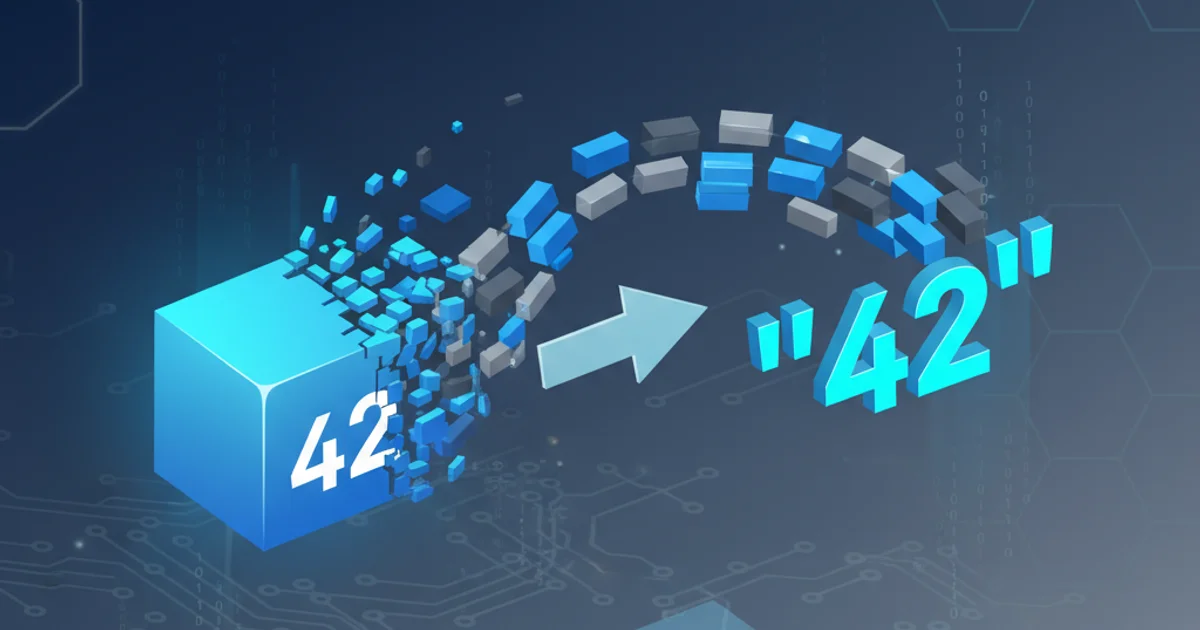How can I convert an int to a string in C?
Categories:
Converting Integers to Strings in C: A Comprehensive Guide

Learn various methods to convert an integer to its string representation in C, including standard library functions and manual approaches.
Converting an integer to its string representation is a common task in C programming. This operation is essential for tasks such as printing numbers to the console, writing them to files, or displaying them in user interfaces. Unlike some higher-level languages, C does not have a built-in operator for this conversion, requiring the use of specific functions or manual implementation. This article will explore several robust methods to achieve this, detailing their usage, advantages, and potential pitfalls.
Understanding the Need for Conversion
In C, integers and strings are fundamentally different data types. An int stores a numerical value in binary format, while a char array (or string) stores a sequence of ASCII or other character encodings. Direct assignment or casting between these types is not possible for conversion. When you need to display an integer as human-readable text, concatenate it with other strings, or save it in a text-based format, you must convert its numerical value into a sequence of character digits.
flowchart TD
A[Integer Value] --> B{Conversion Process}
B --> C["Character Array (String)"]
C --> D["Display/File I/O"]
B --> E["Error Handling (e.g., Buffer Overflow)"]Conceptual flow of integer to string conversion in C.
Method 1: Using sprintf()
The sprintf() function (string print formatted) is one of the most versatile and commonly used methods for converting integers to strings in C. It works similarly to printf(), but instead of printing to standard output, it writes the formatted output to a character array (string). You need to provide a buffer large enough to hold the resulting string.
#include <stdio.h>
int main() {
int number = 12345;
char str[20]; // Buffer to hold the string. Max 10 digits for int + sign + null terminator
sprintf(str, "%d", number);
printf("Integer: %d\n", number);
printf("String: %s\n", str);
int negative_number = -6789;
char neg_str[20];
sprintf(neg_str, "%d", negative_number);
printf("Negative Integer: %d\n", negative_number);
printf("Negative String: %s\n", neg_str);
return 0;
}
Example of using sprintf() to convert an integer to a string.
sprintf(). A safe estimate for an int is sizeof(int) * CHAR_BIT / 3 + 3 (for sign, digits, and null terminator), or simply a sufficiently large fixed-size buffer like char str[32]; for most practical purposes.Method 2: Using itoa() (Non-Standard)
The itoa() (integer to ASCII) function is a convenient way to convert an integer to a string. However, it's important to note that itoa() is not part of the C standard library (ISO C). It's a common extension found in compilers like GCC and those from Microsoft, but its availability and behavior can vary across different systems. If portability is a concern, sprintf() is generally preferred.
#include <stdio.h>
#include <stdlib.h> // For itoa() on some systems
int main() {
int number = 9876;
char str[20];
// Base 10 conversion
itoa(number, str, 10);
printf("Integer: %d\n", number);
printf("String (base 10): %s\n", str);
int hex_number = 255;
char hex_str[20];
itoa(hex_number, hex_str, 16); // Convert to hexadecimal
printf("Integer: %d\n", hex_number);
printf("String (base 16): %s\n", hex_str);
return 0;
}
Example of using itoa() for integer to string conversion (non-standard).
itoa() and portability is an issue, consider implementing your own version or using a preprocessor directive to conditionally compile sprintf() for non-itoa() environments.Method 3: Manual Conversion
For educational purposes, or in environments where standard library functions are restricted, you can implement a manual integer-to-string conversion. This typically involves repeatedly taking the modulus (%) and division (/) of the number by the base (e.g., 10 for decimal) to extract digits, then converting these digits to characters, and finally reversing the resulting string.
#include <stdio.h>
#include <string.h>
#include <stdlib.h>
// Function to reverse a string
void reverse(char* str, int length) {
int start = 0;
int end = length - 1;
while (start < end) {
char temp = *(str + start);
*(str + start) = *(str + end);
*(str + end) = temp;
start++;
end--;
}
}
// Manual integer to string conversion
char* my_itoa(int num, char* buffer, int base) {
int i = 0;
int isNegative = 0;
// Handle 0 explicitly, otherwise empty string is printed for 0
if (num == 0) {
buffer[i++] = '0';
buffer[i] = '\0';
return buffer;
}
// In base 10, negative numbers are handled
if (num < 0 && base == 10) {
isNegative = 1;
num = -num;
}
// Process individual digits
while (num != 0) {
int rem = num % base;
buffer[i++] = (rem > 9) ? (rem - 10) + 'a' : rem + '0';
num = num / base;
}
// Append negative sign
if (isNegative) {
buffer[i++] = '-';
}
buffer[i] = '\0'; // Null-terminate the string
// Reverse the string
reverse(buffer, i);
return buffer;
}
int main() {
int number = 54321;
char str[20];
my_itoa(number, str, 10);
printf("Integer: %d\n", number);
printf("String (manual): %s\n", str);
int neg_number = -123;
char neg_str[20];
my_itoa(neg_number, neg_str, 10);
printf("Negative Integer: %d\n", neg_number);
printf("Negative String (manual): %s\n", neg_str);
return 0;
}
Manual implementation of itoa() and string reversal.
Choosing the Right Method
The best method depends on your specific needs:
sprintf(): Recommended for most scenarios due to its standardization, flexibility (supports various formats like hexadecimal, octal, padding), and robustness. Always remember to manage buffer size carefully.itoa(): Convenient if you are certain about its availability on your target platform and prioritize conciseness. Avoid for portable code.- Manual Conversion: Useful for learning, embedded systems with minimal library support, or when specific, non-standard conversion logic is required. Generally not recommended for production code where standard library functions are available.